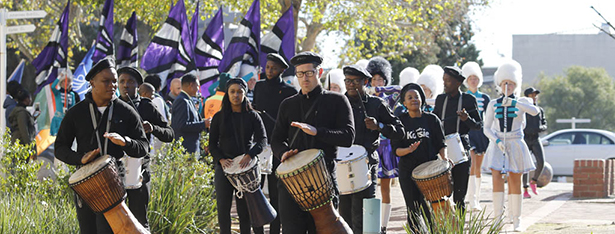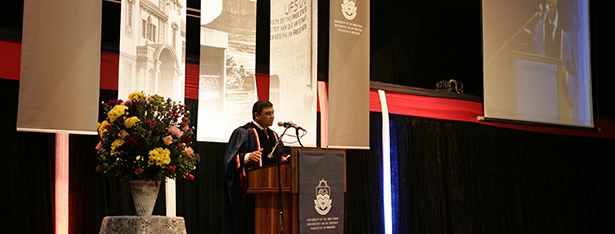Latest News Archive
Please select Category, Year, and then Month to display items
12 January 2024
|
Story Nonsindiswe Qwabe
|
Photo Sonia Small
 Since joining the UFS in 2008, Dr Grey Magaiza has worked extensively on approaches that can foster the socio-economic transformation of societies.
Since joining the UFS in 2008, Dr Grey Magaiza has worked extensively on approaches that can foster the socio-economic transformation of societies.
“The future should be one where communities can decide on their development agenda and futures. That’s the most important for me.” Dr Grey Magaiza, Deputy Director of the Centre for Gender and Africa Studies (CGAS) and Head of the Community Development programme on the Qwaqwa Campus, is passionate about capacitating communities to be agents of change and advancement. His vision for the future emphasises the empowerment of communities to take charge of their development by actively participating in decision making and the implementation of development projects that can improve their lives.
Since joining the UFS in 2008, Dr Magaiza has worked extensively on approaches that can foster the socio-economic transformation of societies. Over the years, he has crafted his research speciality into one that he is most proud of – being an interdisciplinary scientist immersed in the development of communities.
“I’m in a fortunate position of researching what I like. I say ‘fortunate’, because I’ve taken the time to understand what I’m passionate about, which is the overall field of rural livelihoods and livelihood futures – in short, community development. My research starts from an engaged university, understanding the elements that a university must use to enhance transformation and relevance to its immediate community in terms of development.”
One of the ways he has done this is by looking at social entrepreneurship as a development approach for young people in a rural setting. Through workshops with non-profit and civic organisations in Qwaqwa, Dr Magaiza has been helping these organisations to map out their needs and actively meet them through the involvement and support of external role players.
“We understand that communities are part of the national development agenda, but even that national agenda respects community knowledge and intentions and allows communities to shape their identity. A critical enabler of this is community organising. You bring back the capacity in communities to have dialogues on issues affecting them as spaces for engagement, knowledge exchange, and for people to just talk about their way forward.”
By enabling communities to define their development agenda, they can address their specific needs, challenges, and aspirations, he said. “When I look at livelihood futures, it’s quite an exciting aspect of my work – it’s like looking into a fortune tellers’ globe, because you’re not deciding for communities what they should do, but the communities themselves take those decisions.”
UFS welcomes Prof Francis Petersen in style
2017-05-19

Photo: Johan Roux
Photo Gallery
Through a series of joyous events, the University of the Free State’s (UFS) Qwaqwa, South, and Bloemfontein Campuses officially welcomed Prof Francis Petersen as the 14th Rector of the UFS during the past week.
Celebrations end on a high note
The Bloemfontein Campus would not be upstaged and they came out in full support. Performances by staff and student talent impressed the crowd. Invited school performances brought flair and a youthful energy to the celebrations.
Prof Petersen thanked all in attendance, including his family. “It has been a great time of prosperity and well wishes from all three campuses. I have experienced a sense of belonging. I want this experience for all staff, students, and for all those who visit our campus,” said Prof Petersen.
“There is an African idiom that says: ‘If you want to go fast, travel alone; but if you want to travel far, travel together’. If we want to go far as an institution, we will all need to travel together and that means working together,” Prof Petersen added.
Prof Petersen concluded by stating that the UFS is a good institution, but together, it will be a great institution, not just in Bloemfontein or the Free State, but in South Africa, in Africa, and finally globally.

Prof Francis Petersen, Vice-Chancellor and Rector of the UFS
Photo: Johan Roux